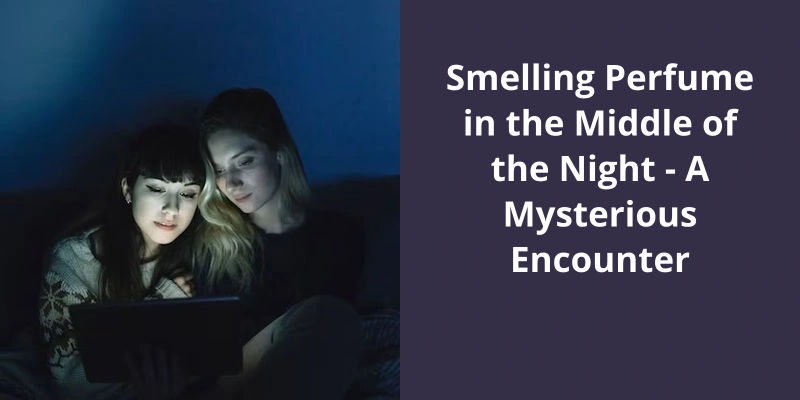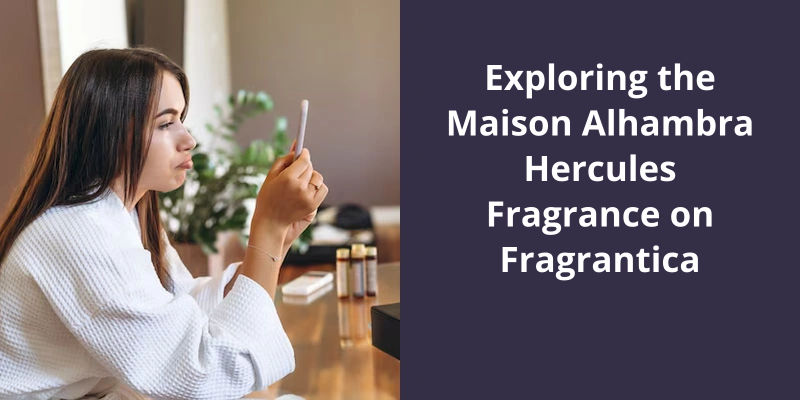The night can be a strange and mysterious time. It's when most people are asleep, and the world is quiet and still. But sometimes, the silence can be broken by an unexpected scent. Perhaps you're lying in bed, drifting off to sleep, when suddenly your nostrils fill with the heady aroma of perfume. You inhale deeply, trying to identify the scent, but it's elusive—it's there one moment, and gone the next. It's a reminder that there may be mysteries lurking in the darkness, just waiting to be discovered. And it's a testament to the power of scent—how it can evoke memories, emotions, and even alter our perceptions of reality. In this article, we'll explore the phenomenon of smelling perfume in the middle of the night, and what it might mean for those who experience it.

Is It Possible to Smell in Your Sleep?
Have you ever wondered whether it’s possible to smell in your sleep? Well, the answer to that question might surprise you. According to recent research and experiments conducted by scientists, it seems that people don’t respond to odours while they’re in the dreaming phase of sleep (REM) or deep sleep. This indicates that you can’t smell while you’re asleep, as Professor Rachel Herz from Brown University describes it.
Professor Herz has been studying the science of smell and odour perception for over 20 years, and she’s one of the worlds leading experts on the topic. Through years of research and experiments, she’s discovered that when we’re asleep, our brains don’t process odours in the same way they do when we’re awake.
This means that while we might not be consciously aware of the odour, it can still impact our brain and body in various ways, such as altering our heart rate, respiratory rate, and brainwaves.
This information has important implications for understanding how our sense of smell works and how it impacts our health and well-being. For example, it suggests that certain smells could potentially be used as a tool to help us achieve better quality sleep or to improve our overall emotional state. Additionally, it could be useful for developing new therapies and treatments for people who suffer from sleep disorders or other related conditions.
The smell we experience after waking up can vary depending on our individual biological processes, but it’s not uncommon for it to be less than pleasant. Our bodies naturally shed skin cells and secrete oils while we sleep, which can contribute to a less-than-pleasant aroma. Additionally, heavy sweating and overnight bacterial buildup may also play a role in the scent we wake up to each morning.
What Is the Smell After Sleeping?
It isn’t uncommon to notice a particular smell after waking up in the morning from a good nights sleep. This smell could be caused by a number of natural body processes that occur while we rest. For instance, individuals may unknowingly sweat at night, which overtime could accumulate and produce a stale odor, making it difficult to differentiate between the smell or the body odor.
According to experts, several distressing health conditions such as liver disease, diabetes, and urinary tract infections, among others, can cause an unpleasant smell on the body. For this reason, it’s important to consult a medical professional if the smell is constant and can’t be attributed to a natural body process.
Thus, while there can be natural explanations for the smell that arises after sleeping, it’s important to wash your sheets, clothes and body regularly to ensure that any bacterial accumulation doesn’t lead to an unpleasant odor. This can be done through daily hygiene practices that help to reduce the build-up of bacteria on the skin, clothing, and bedding. Also, some people may want to use deodorants and fresheners to help mask any residual smells that might occur despite proper hygiene.
This smell can be a result of natural body processes like sweating, skin shedding or oil secretions. Nonetheless, it’s important to note that certain underlying conditions could contribute to a persistent odor that should be checked out by a medical professional. On the other hand, practicing good hygiene practices, including the body, clothing, and bedding can help control any unpleasant smells.
Dreams are a fascinating phenomenon that are often interpreted to gain insight into our subconscious and the world around us. One of the most common dream experiences is the sense of smell, particularly with the scent of perfume. Surprisingly, smelling perfume in your dream can hold significant meaning and may indicate positive outcomes in your life. Let’s delve deeper into the symbolism behind this dream image.
What Is the Meaning of to Smell Perfume in a Dream?
The experience of smelling perfume in a dream is often interpreted as a positive omen. According to dream interpreters, such a dream may signify the attainment of long cherished aspirations. This may also be an indication of good fortune coming your way.
Perfumes have been used as offerings in many spiritual and religious ceremonies. It may also signify the beginning of a new chapter in your life or a fresh start.
As with any dream interpretation, it’s important to consider the details of the dream and to look for recurring themes and symbols to understand the significance of such dreams. Ultimately, it’s up to you to decide what resonates with you and how you choose to incorporate such knowledge into your life.
Now that we know that wearing perfume to bed is okay, let’s delve deeper into the benefits of wearing perfume at night and how to choose the right scent for a good night’s rest. Whether you prefer a floral, woody, or citrus aroma, there’s a perfect fragrance for every bedtime routine. So, let’s explore the world of fragrances and their potential impact on your sleep.
Can You Wear Cologne at Night?
Wearing cologne at night can be a personal choice that varies from person to person. While some people may prefer to keep their bedtime routine fragrance-free, others find that scent can have a soothing effect on the mind and body. Research has shown that certain fragrances, such as lavender and chamomile, can help promote relaxation and improve the quality of sleep. So, if you find that wearing perfume helps you unwind and have a more restful nights sleep, go for it!
But, it’s important to remember that not all fragrances are created equal. Some perfumes may contain ingredients that can be irritating to the skin or cause allergies. Additionally, some scents can be too strong and overpowering, making it difficult to fall asleep or even causing headaches. Before wearing perfume to bed, make sure to test the fragrance on your skin first and check for any reactions. It’s also a good idea to choose a light and subtle scent rather than a heavy, bold one.
Another factor to consider is the type of bedding and fabrics youll be coming into contact with while wearing perfume. Some materials, such as silk and satin, can be easily stained or damaged by certain fragrances. To avoid any mishaps, consider spraying the perfume on your clothes instead of directly on your skin. This way, you can still enjoy the scent without risking any damage to your bedding or clothing.
Lastly, it’s important to consider your surroundings and how your fragrance may affect those around you. If youre sharing a bed or room with someone else, be mindful of their sensitivities to smell. You wouldnt want to cause any discomfort or disrupt their sleep with a strong or overpowering scent.
However, it’s important to choose a light and subtle fragrance, test the scent on your skin first, and be mindful of your surroundings and those around you. By following these simple tips, you can enjoy the benefits of perfume without any negative consequences.
Source: Is wearing cologne to bed normal? – Quora…
Conclusion
There are many theories and explanations for why people have these experiences, ranging from spiritual and supernatural explanations to scientific and medical ones. While some people may dismiss these experiences as mere hallucinations or random occurrences, others find them to be significant and meaningful, often attributing them to the presence of loved ones who’ve passed away.





